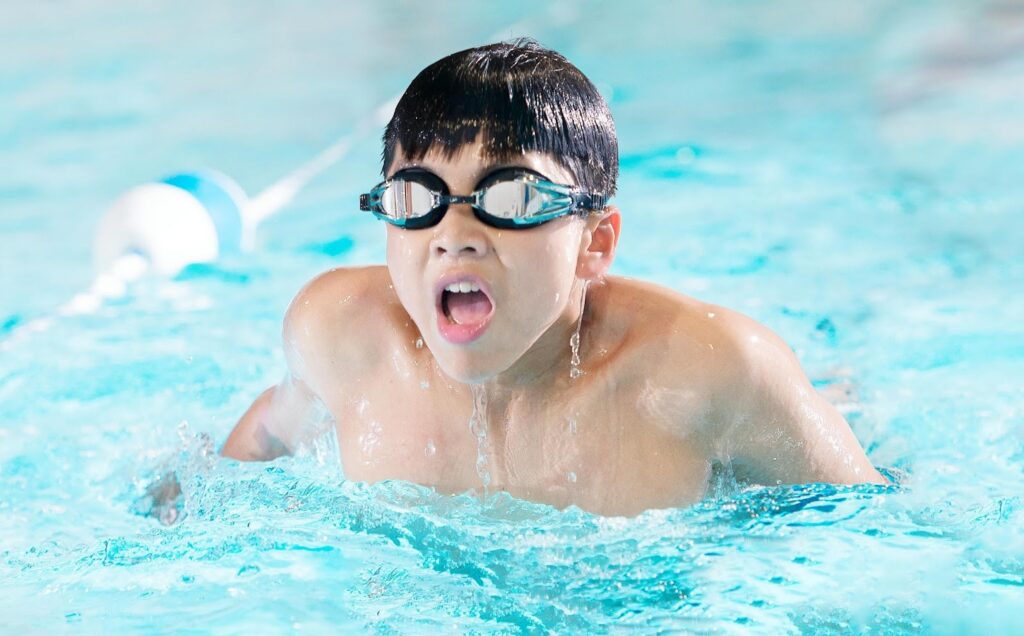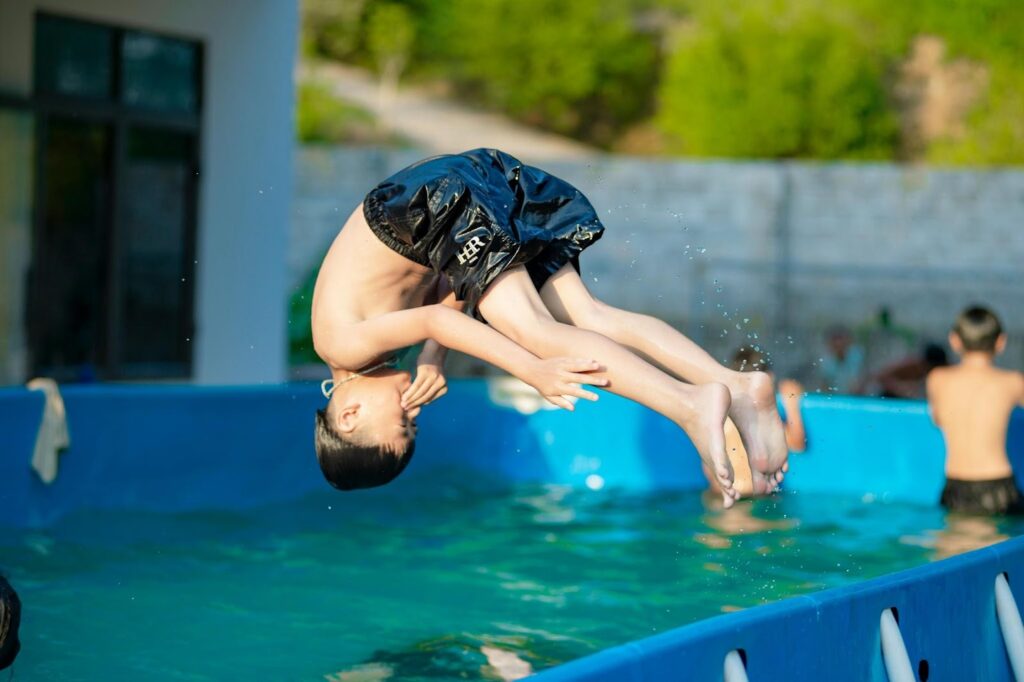
Your Health Magazine
4201 Northview Drive
Suite #102
Bowie, MD 20716
301-805-6805

More Child Health and Safety Articles
8 Health and Safety Advantages of Introducing Swimming at a Young Age
Swimming is a crucial life skill that can have a profound impact on a child’s health and safety. Introducing swimming at a young age helps children build confidence in the water, develop critical survival skills, and strengthen their bodies and minds. Beyond the pool, swimming nurtures social connections and supports long-term physical and mental well-being. When taught early, these benefits become deeply ingrained, shaping healthier, safer habits that can last a lifetime. By starting young, children enjoy the immediate joy of splashing and playing, and gain skills that protect and sustain them well into adulthood.

Developing Critical Water Safety Skills
One of the most important benefits of early swimming lessons is the development of water safety awareness and skills. Children who begin swimming at a swim school learn how to float, tread water, and safely reach the pool’s edge, which are abilities that can be lifesaving in emergencies. They gain an understanding of safety rules, such as avoiding running near pools or swimming alone. Early exposure builds instinctive reactions that help children remain calm if they ever find themselves in unexpected situations around water. While supervision remains vital, these skills significantly reduce the risk of accidents.
Enhancing Cardiovascular and Respiratory Health
Swimming is a gentle but powerful way to strengthen the heart and lungs, even in young children. The combination of rhythmic breathing and continuous movement boosts circulation, improves oxygen intake, and enhances endurance. Unlike high-impact activities, swimming is easy on developing joints while still providing a full cardiovascular workout. These early benefits set the stage for better stamina and reduced risk of cardiovascular problems later in life. By starting young, children can build a healthy foundation for participating in other sports and activities that rely on strong cardiovascular performance.
Building Muscle Strength and Coordination
Swimming engages nearly every major muscle group, making it an ideal activity for developing strength, flexibility, and balance in children. The natural resistance of water works the muscles gently but effectively, promoting growth without placing unnecessary stress on growing bones or joints. Young swimmers often see improvements in posture, core strength, and body alignment, while an enhanced range of motion helps them move more efficiently in and out of the pool. Coordinating arm strokes, leg kicks, and breathing patterns strengthens the brain-body connection, improving motor planning and reflexes. These foundational skills carry over into other physical activities, supporting athletic performance in sports, dance, and general physical play, and fostering confidence in their physical abilities from an early age.
Strengthening the Immune System
Regular swimming can contribute to a stronger immune system by improving circulation and promoting better fitness. Physical activity stimulates the production of white blood cells, helping the body fight infections more effectively. For children, swimming lessons offer a consistent, year-round way to stay active, even in colder months when outdoor activities may be limited. This regular exercise helps maintain a healthy weight, regulate metabolism, and reduce stress levels, all of which contribute to immune resilience. Early participation ensures these benefits accumulate, supporting long-term health.
Lowering the Risk of Accidental Drowning
Drowning remains one of the leading causes of accidental death among children, but early swimming instruction can dramatically reduce this risk. Introducing children to swimming at a young age teaches important survival skills such as floating, treading water, and controlled breathing, allowing them to react calmly in emergencies. Studies indicate that children who participate in lessons before age five have a significantly lower likelihood of drowning compared to those without early exposure. Beyond physical skills, swimming lessons instill critical safety habits, including understanding pool rules, never entering water without supervision, and recognizing unsafe conditions. Early education builds awareness and confidence around water, helping children enjoy aquatic environments while staying safe.
Boosting Cognitive Development and Concentration
Swimming is great for the brain. The combination of physical activity, breath control, and coordinated movement stimulates brain development, supporting memory, learning ability, and focus. Early swim lessons require children to follow instructions, remember sequences, and adjust their movements, which are tasks that improve problem-solving skills and discipline. Research suggests that children who swim regularly tend to reach developmental milestones sooner, and they may experience better academic readiness when starting school.
Encouraging Social Skills and Confidence
Swimming lessons often occur in group settings, giving children ample opportunities to interact with peers, practice cooperation, and build meaningful friendships. Participating in group activities such as relay races, paired exercises, or team-based games fosters key social skills, including communication, patience, and empathy. For children who are shy or hesitant, swimming can serve as a confidence booster, as successfully mastering strokes, floating techniques, or breathing exercises provides a sense of pride and accomplishment. Overcoming initial fears of the water helps children develop resilience and self-assurance that extends beyond the pool. These positive experiences encourage them to try new activities, engage with others more confidently, and approach challenges in everyday life with a strengthened sense of capability.
Promoting Lifelong Healthy Habits
Introducing swimming at a young age often instills a lifelong love of physical activity, making it easier for children to maintain healthy habits into adulthood. Because swimming is low-impact, gentle on joints, and adaptable to different fitness levels, it can remain a safe and enjoyable exercise for all ages. Children who associate swimming with fun are more likely to embrace an active lifestyle, which can reduce the risk of obesity, cardiovascular disease, and other chronic health issues later in life. Early exposure to swimming promotes discipline, perseverance, and self-care, encouraging children to make healthier choices physically and mentally. By fostering these positive routines early, parents help children establish habits that support long-term wellness and balanced living.

Introducing swimming at a young age offers far-reaching benefits that go well beyond the pool. From lifesaving safety skills and stronger cardiovascular health to better coordination, immunity, and confidence, swimming builds a foundation for physical and mental well-being. It empowers children to navigate aquatic environments safely while fostering a love for active living. By making swimming an early part of childhood, parents provide their children with a skill set that safeguards their health, enhances their development, and enriches their lives for years to come.
Other Articles You May Find of Interest...
- What is Baby Acne? Causes, Symptoms, and How to Help
- Child Speech Therapist: Speech Therapy for Toddlers & Kids
- Navigating Your Body’s Changes: The Period After Birth
- Lice Removal Washington DC: How Lice Free Noggins Helps Families Get Lice-Free Quickly and Safely
- Effective Strategies for Lice Prevention to Keep Your Family Safe
- Beyond Crayons: 7 Best Coloring Apps That Nurture Kids’ Creativity & Calm
- Choosing the Right Remedies for Your Child’s Stomach Upset: Is Kids Pepto the Solution?














